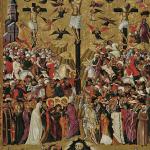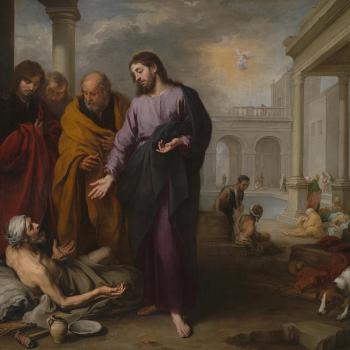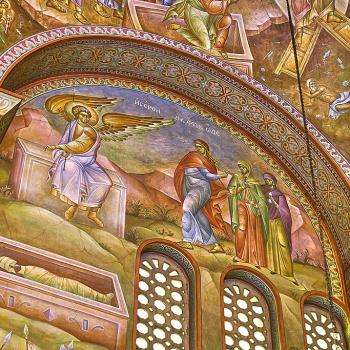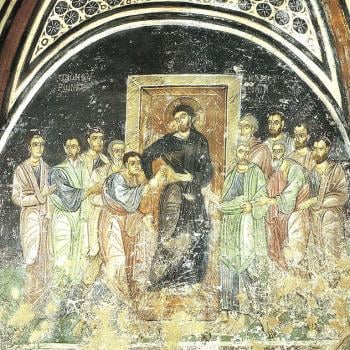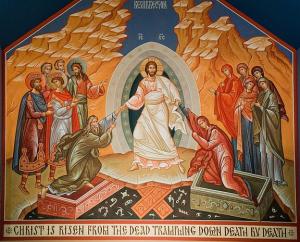
Christ is Risen!
The doctrine of the death and resurrection of Christ is not about a man who died and then was later resuscitated. Resuscitation is different from resurrection, for resuscitation brings one back from death to the kind of life they had before death, which resurrection is transformative and the one who is resurrected will never die again. In the resurrection of Christ, we have been shown that death itself has an end, that it can be and has been transcended, because it has been transcended in Christ. He was raised in glory, and now he lives and exists with a new mode of being, as the natural cycle of life and death has been overcome. Now, Jesus will take us with him so that in the eschaton, we will be resurrected, and in our resurrection, have the potential to participate with him in his glory.
Jesus lives, and not only does he live, he has brought true life to the world, the life which transcends death. The way we receive that new life is to follow him and his example; that is, we must first let the circle of life, the natural cycle of history, have its share of us; we must accept that we shall die and have faith that in our death we will be embraced by him and have him vindicate us even as he was vindicated in his own resurrection from the dead. The resurrection is said to be spiritual, but we must understand, this does not mean the material world and all that is in it shall be cast aside, rather, all that is in it shall also be taken in by Christ and be spiritualized, so that in the eschatological kingdom, all things found in time and space will have their part:
The resurrection of Jesus Christ is a new beginning which brings to an end the dominations of historical time and space. And yet, His resurrection happens within the orbit of earthly time and space. God mysteriously has now entered into the history of humanity and from inside is setting about to destroy sin, corruption and death. This is done completely in Jesus but, gradually through His risen presence in His living members who become leaven, God speaks to raise all of humanity and the whole of creation into a sharing of Jesus’ new life.[1]
Jesus is the God-man, the Logos who took on human existence, and with it, creaturely existence, indeed, a historical existence tied to the natural cycle of life and death. However, we should see that he did so in a unique way. The cycle of life connects birth and death in many ways. Everyone who is born is on their way to their death. Jesus was born of the virgin Mary, and so, in that sense, he continued the cycle when he died. Nonetheless he did so in a way which is against the norm so that he could change the cycle from within, first in his virgin birth, and then in death, where death, and not Jesus, came to its end. The eternal Logos who was with God the Father before all ages, who with the Father and the Spirit, created all things, joined in with creation so that from within creation itself the modality of being which came to be due to sin could be overturned. So many of those laws which we understand to be as natural reflect the modality of being contaminated by sin, a modality which bound all those who were bound by sin. But, as Jesus was not contaminated by sin, he was above such laws and was able to help release us from them:
In his life, his death and his resurrection Jesus Christ shows that God, incarnate in him, is above law and reason, that he can do far more than immobilize evil by his strength or unmask it by his light; he is the Spirit of life and love, and he redeems and saves that nature which has fallen into rack and ruin, transforming its falsities into truth, its wickedness into goodness – and in this act of triumphant love God finds his own glory. [2]
The glory of the resurrection is not limited; it is not only for a select few, rather, as the Logos assumed human nature, and become a part of creation, in and through him, all of creation is being engaged by it. All creation is granted grace in light of Jesus’ resurrection from the dead:
And as for the Resurrection, it banished death and its corruption, it cast out Hades with its gloom, it raised the dead from their tombs, it wiped away (as the prophet says) all tears from every face, and on every living person it bestowed the grace that lasts forever. You see, the gift of the Resurrection was not restricted nor was its achievement evident only to a certain few: For He who entombed himself (or rather performed the Resurrection) in a human body was the God of all creation, and He who knows not how to bestow the gift of grace in a partial way and in whom respect of persons finds now place, made the Resurrection available for all human flesh. Being recognized as the true God of all, He extends the gift of salvation to all human beings, caring for his own image and renewing it to the fullest degree, since every earthly person has been fashioned in the image of God.[3]
The triumph of Christ’s resurrection is the triumph of God’s love over death. The cycle of life and death in history reflects, in part, the power of sin and the way sin corrupts and destroys what it touches. But the triumph of sin was fleeting. When it came face to face with Jesus Christ, it found a self-emptying love which it could not control or dominate. We rejoice in the resurrection because we have been shown the power of sin has been overcome, the sting of death is no more, and the natural cycle of history, corrupted by sin, does not have the final say. Christ is risen from the dead, and those in the graves dominated by sin now have been granted life!
[1] George A. Maloney, SJ, Communion of Saints (Hauppauge, NY: Living Flame Press, 1988), 29.
[2] Vladimir Solovyey, God, Man & The Church. The Spiritual Foundations Of Life. Trans. Donald Attwater (Cambridge: James Clarke & Co., 2016), 76.
[3] St Sophronios of Jerusalem, “Homily 1: Homily on the Exaltation of the Revered Cross and on the Holy Resurrection” in Homilies. Trans. John M. Duffy (Cambridge: Harvard University Press, 2020), 3-5.


